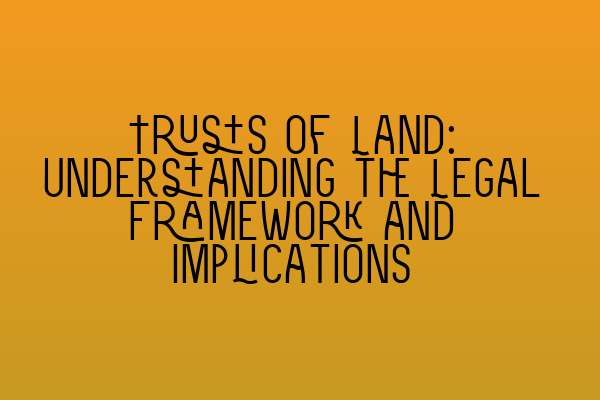Trusts of Land: Understanding the Legal Framework and Implications
Trusts of land play a crucial role in property law, serving as a legal framework for managing ownership and interests in land. Whether you are a property owner, investor, or professional in the real estate industry, understanding the intricacies of trusts of land is essential to navigate the complexities of property transactions and disputes.
In this comprehensive guide, we will explore the legal framework of trusts of land, examine their implications, and shed light on key concepts and terminology. By the end of this article, you will have a solid foundation to comprehend the nature of trusts of land and their significance in property law.
What is a Trust of Land?
At its core, a trust of land is a legal arrangement where the legal ownership of a property is held by one or more individuals (known as trustees) on behalf of another person or group (known as beneficiaries). The trustees have the legal title to the property, but they hold it in trust subject to certain obligations and duties.
The purpose of a trust of land is to manage and protect the interests of beneficiaries, ensuring that their rights and entitlements are respected. Trusts of land can be created by express declaration, implied entry, operation of law, or through a trust for sale under the Law of Property Act 1925.
Types of Trusts of Land
Trusts of land can be classified into two main categories: bare trusts and trusts for sale.
Bare Trusts:
In a bare trust, the legal title and beneficial interest in the property are held by the trustees, but they have no active duties or obligations. Essentially, the trustees act as mere nominees for the beneficiaries, who have the absolute right to the property. Bare trusts are straightforward and do not involve complex management or decision-making processes.
Learn more about bare trusts in our dedicated article: SQE 1 Practice Exam Questions.
Trusts for Sale:
Trusts for sale are more commonly encountered in practice and involve active management and decision-making by the trustees. These trusts arise when there is a need to sell the property or when beneficiaries have competing interests or conflicting rights. Trustees in a trust for sale are tasked with managing the property, making decisions about its sale, and distributing the proceeds among the beneficiaries in accordance with their interests.
If you are preparing for the SQE exams, check out our practice mocks: SQE 1 Practice Mocks FLK1 FLK2.
Implications of Trusts of Land
Trusts of land have significant legal, financial, and practical implications for all parties involved.
Legal Implications:
From a legal standpoint, trusts of land impose certain obligations and duties on trustees. They are expected to act in the best interests of the beneficiaries, exercise reasonable care and skill, and avoid conflicts of interest. Trustees must also keep accurate records of transactions and provide regular updates to beneficiaries to ensure transparency.
Financial Implications:
Trusts of land can have financial implications, especially in the context of property transactions. Trustees may need to obtain consent from beneficiaries before selling or mortgaging the property, as their interests and rights are directly affected. Additionally, trustees must diligently manage the property and ensure that any income or rent generated is distributed to the beneficiaries in accordance with their respective entitlements.
If you need further guidance on property law, consider our SQE 2 preparation courses: SQE 2 Preparation Courses.
Practical Implications:
Practically, trusts of land require effective communication and collaboration between trustees and beneficiaries. Trustees are responsible for making decisions about the property, such as maintenance, renovation, and improvements, in consultation with the beneficiaries. Regular meetings, updates, and transparency are key to ensuring a harmonious and efficient management of the property.
In Conclusion
Trusts of land play a vital role in property law, providing a legal framework for managing ownership and interests in land. Understanding the legal framework, types, and implications of trusts of land is essential for anyone involved in property transactions or disputes.
If you are preparing for the SQE exams, check out our comprehensive SQE 1 preparation courses: SQE 1 Preparation Courses.
To stay updated with the latest SRA SQE exam dates, visit: SRA SQE Exam Dates.
Remember, property transactions and disputes can be complex, and seeking advice from a qualified property law solicitor is always a wise decision.
